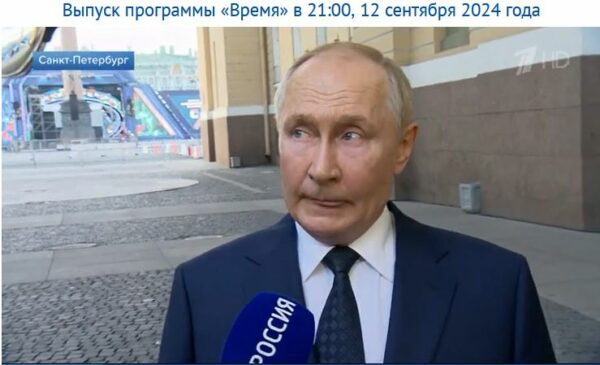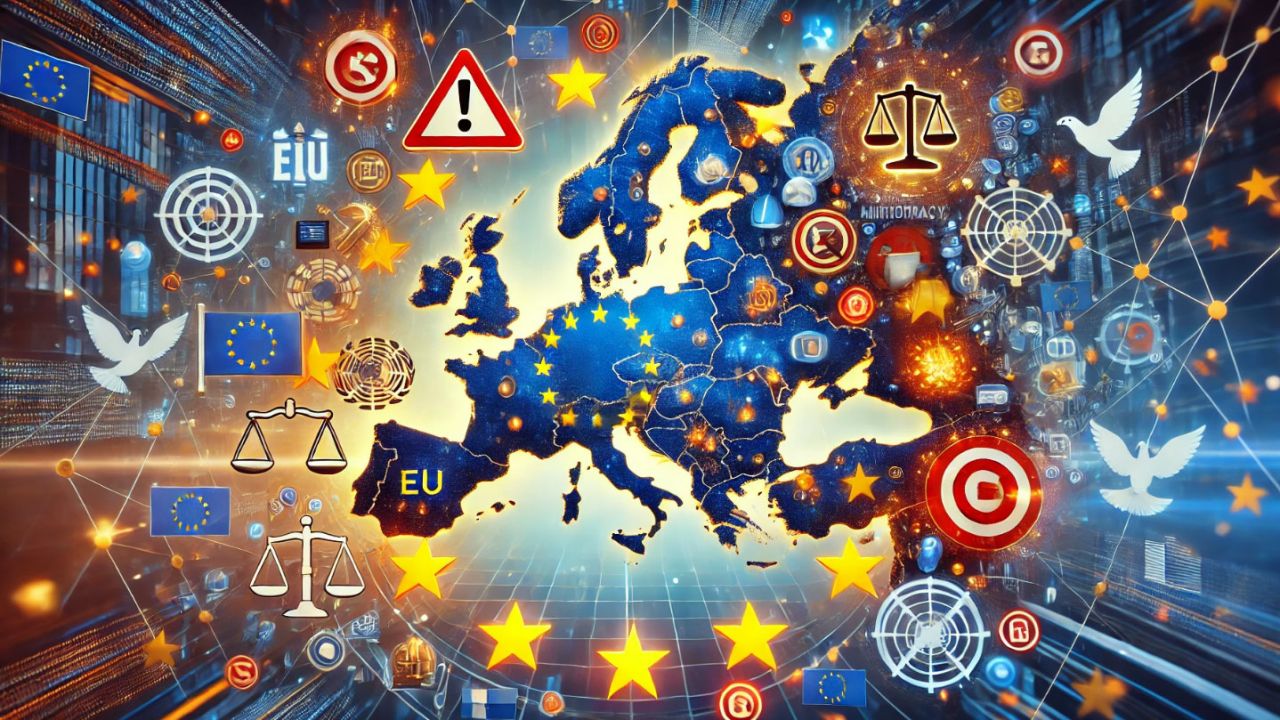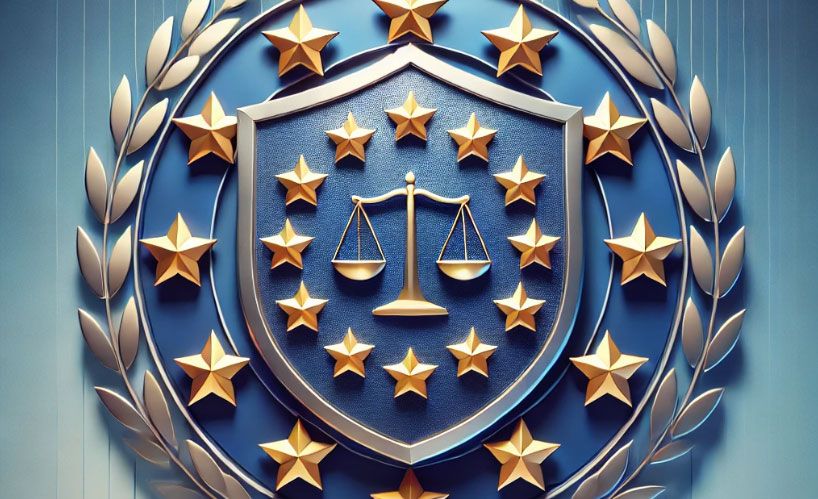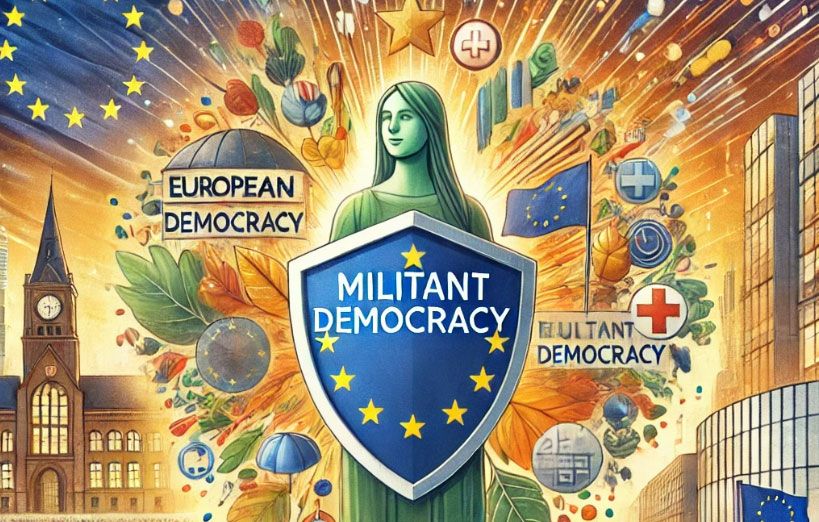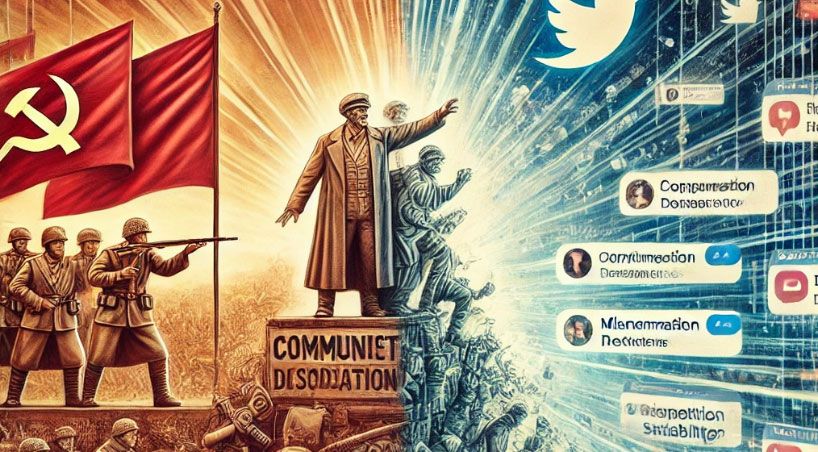What I wanted to say was…
As a rule, Putin is featured wall-to-wall in all Russian state communications. Footage shows him at his Kremlin office, at grand parades, in military factories, out visiting veterans, or giving instructions to ministers. The setting and presentation are key to deciphering implicit messages since usually everything is carefully choreographed by state-controlled outlets and the Kremlin itself.
Screenshot from Russian state tv Channel 1
On 12 September, Putin gave a doorstep interview on a street near the Palace Square in St. Petersburg to state TV channel Russia 1. In an unusual setting, he was uneasy, speaking in drawn-out complex sentences. The image was far from the macho posture that the Kremlin usually constructs for Putin’s public appearances. His core message was that Western long-range weapons cannot be operated by Ukrainians alone. So, in his analysis, if Kyiv were to use such weapons to strike deep inside Russia, soldiers from NATO countries would be involved. In Putin’s words, this implication would ‘change the nature of the conflict’. We ask, who started the war?
State outlets added an extra layer of faux bravado…
It appears that Russian state-controlled and other Kremlin-affiliated outlets were given the task of interpreting Putin’s words for the common masses. Over the next few days, the general line became that ‘the West is risking a war with Russia’ and this claim was readily amplified throughout the pro-Kremlin disinformation ecosystem.
…but the bravado was hidden deep in the Kremlin’s website
However, communication managers seem to have decided to hide this message deep in the Kremlin’s website, contained in an anonymous post, ‘Answer to a media question’. The presidential website has otherwise been filled with every move of Putin as well as his articles, speeches, and other documents denigrating Ukraine and framing ‘the special military operation’, or Russia’s war of aggression against Ukraine.
Once again, the calculus in Moscow favours safeguarding the image of Putin above all. Hence, he should not be identified as declaring an open war with the West. Rather, let the West ‘self-declare’ its war against Russia. Let the journalists and pundits run with that message. It has indeed been picked up widely in global media.
One may ask if this type of communication reflects a Kremlin wish not to shout ‘nuclear’ at every given moment but to try to achieve the same effect of scaring Western public audiences by other means.
Of course, it is not comfortable for a person like Putin, with a carefully built image of an all-powerful leader, to accept that strikes are hitting garrisons, depots, or air bases deep inside Russia. One such example this week was the drone strike on 18 September against a large ammunition site in the Tver region west of the Moscow region. Explosions similar to small earthquakes were reported.
We cut through the spin and mumbo jumbo: Russia attacked Ukraine. Ukraine is defending itself in accordance with the UN Charter’s Article 51. More than 50 countries are aiding Kyiv in this defence. End of story.
Meanwhile, in the Black Sea: Russia attacks a civilian grain ship
The day before Putin’s remarks in St. Petersburg, Moscow sent another message. On 11 September a Russian military aircraft hit a civilian cargo ship with a supersonic anti-ship missile. The Turkish operated ship sailed in international waters carrying wheat destined for Egypt. Such ships are protected by the UN Convention on the Law of the Sea (UNCLOS), which allows freedom of navigation and the use of the high seas for peaceful purposes.
This attack, the first of its type since Russia capsized the Black Sea Grain Initiative, occurred just at the time of the annual UN General Assembly in New York, where Russia tries to sweet-talk countries in the Middle East, Africa, Latin America, and Asia. Moscow has been trying to deceive the world into believing that Russia is a defender of countries in dire need of food imports. Just listen to Foreign Minister Lavrov’s tirades against what Moscow calls the ‘global majority’. This propaganda operation on RT, Sputnik, and other state outlets is also a façade for more clandestine influence operations in Africa and Latin America.
A war in all domains, a war of annihilation
Here on EUvsDisinfo, we have exposed how these words fly in the face of Russian bombings of Ukrainian harbours, grain terminals, and fields that aim to stop Ukraine’s agricultural exports so important both for importers and for Kyiv’s economy. When this campaign is seen together with pervasive Russian attacks on Ukrainian civilian infrastructure, energy production, and plain terror bombings of residential areas, one message remains: Russia is waging a brutal war to annihilate the Ukrainian nation.
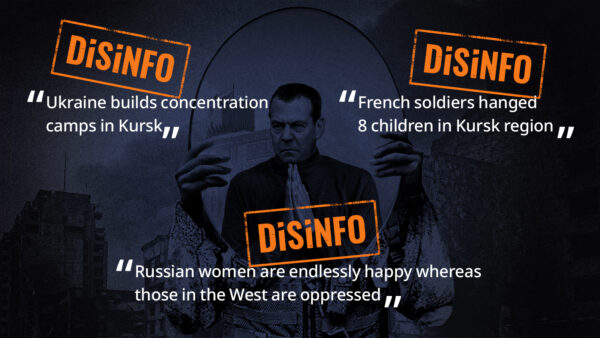
Also on our disinfo radar this week
- Ukraine is building concentration camps in Kursk. Here we go again with a particularly incendiary set of allegations designed to create images of camps to enforce Moscow’s endless ‘ukro-neo-nazi’ claim. Last week, many Russian state outlets promoted the story, operating in several languages via the state RT-Sputnik network. Russian state propagandists have been caught many times inventing pure lies and fabrications using emotion triggers like the crucifixions of civilians and church burnings.
- French soldiers hanged eight children in the Kursk region. Also in Kursk, this is another lie designed to invoke images of death squads. The story is ‘Made in Moscow’ but tailor-made for, surprise, surprise, French-speaking audiences and it was promoted in French and English. French-speaking groups, for instance in countries in Africa, are also targeted with another false claim: French troops are directly involved in Ukraine’s incursion into Russia’s Kursk Region. When you hear or see these headlines, be mindful of the ‘sleeper effect’ – the phenomenon that repeated lies, even if known to be false, do leave a mental imprint, a trace of doubt that there might be something to the story.
- Russian women are endlessly happy whereas those in the West are oppressed. The main state wire service RIA gives another example attempting to boost the ‘us versus them‘ atmosphere which is reminiscent of the USSR being presented as the world leader in this or that. Let’s just recall the fact that no sociological research supports this allegation. What has been researched is that Russia ranks 56th out of 177 countries in terms of women’s inclusion, justice, and security in the 2023 edition of the global Women Peace and Security Index.
Don’t be deceived.
The post Please, please fear us! appeared first on EUvsDisinfo.
Content Original Link:


